
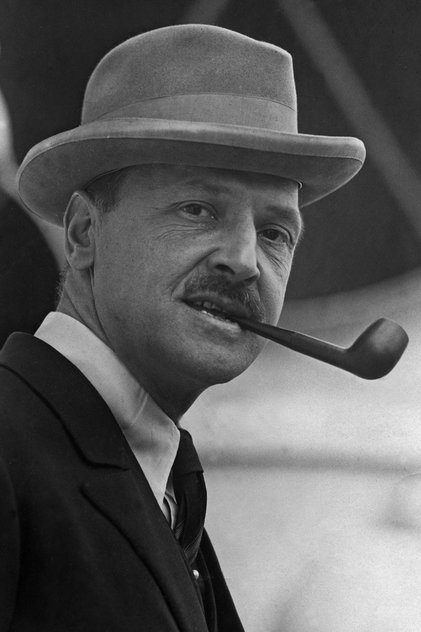
W. Somerset Maugham
Born: January 25, 1874
Died: December 15, 1965
in Paris, France
Died: December 15, 1965
in Paris, France
William Somerset Maugham CH (25 January 1874 – 16 December 1965) was an English writer, known for his plays, novels and short stories. Born in Paris, where he spent his first ten years, Maugham was schooled in England and went to a German university. He became a medical student in London and qualified as a physician in 1897. He never practised medicine, and became a full-time writer. His first novel, Liza of Lambeth (1897), a study of life in the slums, attracted attention, but it was as a playwright that he first achieved national celebrity. By 1908 he had four plays running at once in the West End of London. He wrote his 32nd and last play in 1933, after which he abandoned the theatre and concentrated on novels and short stories.
Maugham's novels after Liza of Lambeth include Of Human Bondage (1915), The Moon and Sixpence (1919), The Painted Veil (1925), Cakes and Ale (1930) and The Razor's Edge (1944). His short stories were published in collections such as The Casuarina Tree (1926) and The Mixture as Before (1940); many of them have been adapted for radio, cinema and television. His great popularity and prodigious sales provoked adverse reactions from highbrow critics, many of whom sought to belittle him as merely competent. More recent assessments generally rank Of Human Bondage − a book with a large autobiographical element − as a masterpiece, and his short stories are widely held in high critical regard. Maugham's plain prose style became known for its lucidity, but his reliance on clichés attracted adverse critical comment.
During the First World War Maugham worked for the British Secret Service, later drawing on his experiences for stories published in the 1920s. Although primarily homosexual, he attempted to conform to some extent with the norms of his day. He became a father and husband, marrying Syrie Wellcome in 1917, three years into an affair that produced their daughter, Liza. The marriage lasted for twelve years, but before, during and after it, Maugham's principal partner was a younger man, Gerald Haxton. Together they made extended visits to Asia, the South Seas and other destinations; Maugham gathered material for his fiction wherever they went. They lived together in the French Riviera, where Maugham entertained lavishly. After Haxton's death in 1944, Alan Searle became Maugham's secretary-companion for the rest of the author's life. Maugham gave up writing novels shortly after the Second World War, and his last years were marred by senility. He died at the age of 91.
Description above from the Wikipedia article W. Somerset Maugham, licensed under CC-BY-SA, full list of contributors on Wikipedia.
Maugham's novels after Liza of Lambeth include Of Human Bondage (1915), The Moon and Sixpence (1919), The Painted Veil (1925), Cakes and Ale (1930) and The Razor's Edge (1944). His short stories were published in collections such as The Casuarina Tree (1926) and The Mixture as Before (1940); many of them have been adapted for radio, cinema and television. His great popularity and prodigious sales provoked adverse reactions from highbrow critics, many of whom sought to belittle him as merely competent. More recent assessments generally rank Of Human Bondage − a book with a large autobiographical element − as a masterpiece, and his short stories are widely held in high critical regard. Maugham's plain prose style became known for its lucidity, but his reliance on clichés attracted adverse critical comment.
During the First World War Maugham worked for the British Secret Service, later drawing on his experiences for stories published in the 1920s. Although primarily homosexual, he attempted to conform to some extent with the norms of his day. He became a father and husband, marrying Syrie Wellcome in 1917, three years into an affair that produced their daughter, Liza. The marriage lasted for twelve years, but before, during and after it, Maugham's principal partner was a younger man, Gerald Haxton. Together they made extended visits to Asia, the South Seas and other destinations; Maugham gathered material for his fiction wherever they went. They lived together in the French Riviera, where Maugham entertained lavishly. After Haxton's death in 1944, Alan Searle became Maugham's secretary-companion for the rest of the author's life. Maugham gave up writing novels shortly after the Second World War, and his last years were marred by senility. He died at the age of 91.
Description above from the Wikipedia article W. Somerset Maugham, licensed under CC-BY-SA, full list of contributors on Wikipedia.
Movies for W. Somerset Maugham...
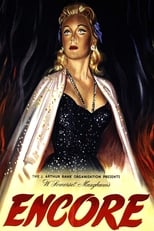
Title: Encore
Character: Self and Narrator
Released: June 11, 1951
Type: Movie
Encore is a 1951 anthology film composed of adaptations of three short stories by W. Somerset Maugham: "The Ant and the Grasshopper", directed by Pat Jackson and adapted by T. E. B. Clarke; "Winter Cruise", helmed by Anthony Pelissier, screenplay by Arthur Macrae; "Gigolo and Gigolette", directed by Harold French, written by Eric Ambler. It is the last film in a Maugham trilogy, preceded by Quartet and Trio.



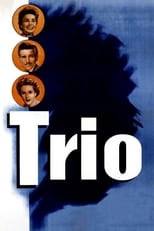
Title: Trio
Character: Himself
Released: October 10, 1950
Type: Movie
W. Somerset Maugham introduces three more of his stories about human foibles.

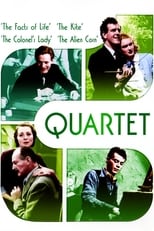
Title: Quartet
Character: Himself
Released: October 26, 1948
Type: Movie
Somerset Maugham introduces four of his tales in this anthology film: "The Facts of Life," "The Alien Corn," "The Kite," and "The Colonel's Lady."

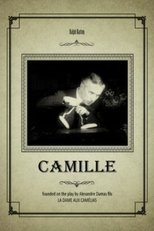
Title: Camille: The Fate of a Coquette
Character: Monsieur Duval
Released: January 1, 1926
Type: Movie
A home movie version of the Dumas play. A young woman becomes a courtesan and tragedy befalls her. Appearances are made by many socialites of 1920s Paris and New York.
